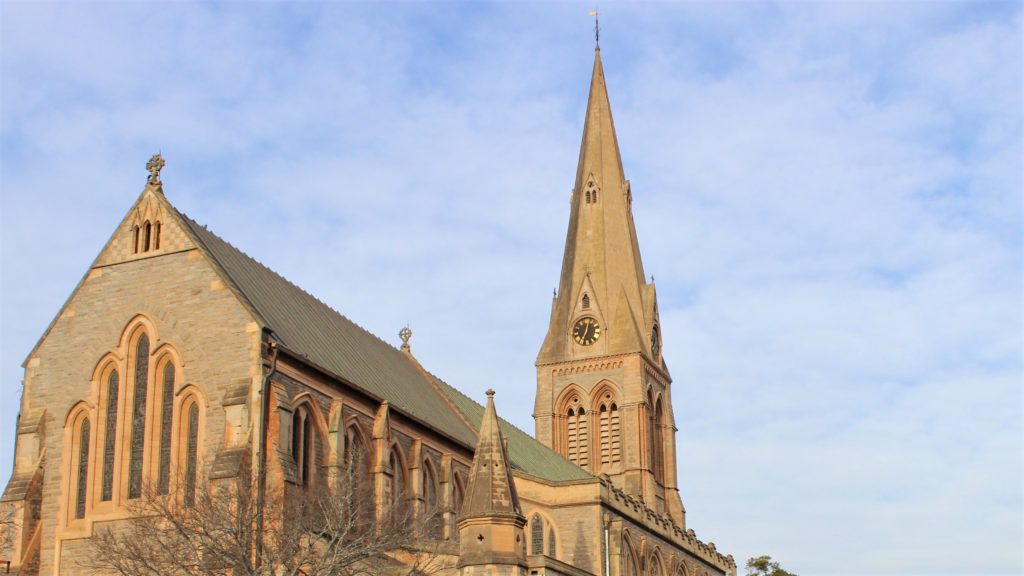Makhanda’s churches are weighing up their pros and cons after being given the go-ahead to reopen their doors. After considering the implications that accompany reopening churches for services, the news was met with mixed responses by church leaders in the community.
“I was quite taken aback when the churches were allowed to reopen. I thought it was unwise,” said Reverend Andrew Hunter of The Cathedral of St Michael and St George. “I thought it was too soon and too risky.
“It’s quite a heavy responsibility for anything that happens for the person leading the service to be responsible for all of those people for what happened in that service. And if something happens, it has implications for the church because the whole church is closed,” said Tendai Chitsike, who is the pastor at Every Nation Church.
Under level 3 of the national lockdown, churches were given the go-ahead to resume, but under stringent regulations. Worship services must be limited to two hours, with a 30-minute interval between each service and a maximum of 50 people. In addition to this, masks are mandatory for all congregants and singing of hymns, along with any physical contact, is strictly prohibited. These are among some of the concerns of many local church leaders.
“It’s quite limiting,” said Pastor Dirk Coetzee of Grahamstown Baptist Church. “It’s a difficult one to monitor.”
Some churches face the issue of having a large number of congregants, such as the Baptist church which averages between 80 and 90 adults and 70 school children for a morning service. Meanwhile, Every Nation Church Grahamstown could have up to 130 congregants in the morning alone. This then brings in the question of who will be allowed to worship and how numbers can be monitored effectively. Furthermore, many of the church leaders have listed older members of the church and children as well as those with comorbidities as their main worries when reopening the churches.
“What is difficult to monitor is who can actually come to church. There [are]a few hindrances on that point,” said Pastor Coetzee.
Other churches, such as the Methodist Church of South Africa and well as the Zion Christian Church have decided to remain closed until the situation has been examined fully and there has been enough feedback and proof that resuming services would be safe. Hunter echoed this, stating that he intends to keep the Cathedral closed for the month of June.
“No, we not opening our building at this stage, we want to be safe for a bit longer – we are concerned about the health risks of gathering,” said Hunter.
Many churches have become accustomed to making use of online platforms and social media in order to stay in touch with their congregants and provide sermons, worship and spiritual support. But this has presented itself as a new and challenging task for some.
“Our main struggles have been trying to remain connected with everyone,” said Chitsike. “It’s been a challenge for people for whom data is an issue.”
“I think the most important struggle that we’ve had is actually keeping up with individuals in the life of the church,” said Coetzee. “We do a lot of accountability ministry that entails one-one-one counselling – and to do that online with students all over the world has made for a very difficult challenge.”
Meanwhile, the church has had to depend on the generosity and understanding of the church community to stay afloat and many pastors have responded with resounding thanks to their congregations for their continued giving.
“I think people have been very generous and some people have specifically been finding out how we’re doing. People have been continuing to pay via EFT, their tithes and offerings,” said Chitsike.
“Many of our people have continued to give and it’s been wonderful – people have continued to believe in the importance of life of the church and so they’ve continued to give as well as to food parcels,” said Reverend Hunter.
“We’ve been very very fortunate – [our congregation has]been very good to us,” said Coetzee. The church leaders all agreed on the importance of the church in promoting the emotional and mental well-being of the church members and feel that, after finding a way to overcome the hurdles set in their path, there will still be great value in reopening the church doors.
“It’s been a very isolating time for people so it’s been hard,” said Hunter. “We’ve put a lot of work and resources, together with others into supporting people.”
“[Fellowship] is very important,” started Pastor Coetzee. “The fact that you can still have open prayer, requests, share testimonies and scripture – there is interaction and I think there’s great worth in that.
“As long as we can keep people’s minds active and focused on the word of God, they remain quite strong.”


